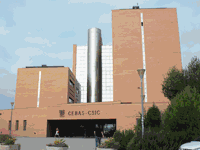
| Research in agricultural sciences at CEBAS-CSIC is key for agricultural development in Mediterranean areas. |
|
The research activity in agricultural sciences at CEBAS-CSIC is organised around five research topics which are key for agricultural development in Mediterranean areas:
Research in irrigation is focussed on optimising water use in Mediterranean agrosystems. For this, deficit irrigation strategies able to maintain yields without affecting fruit quality are developed; new irrigation-scheduling technologies using soil and plant sensors are studied and ornamental wild species of interest under environmental stress conditions are characterised for their use in landscaping, xerogardening, etc.
In plant nutrition, nutrient intake and transport in the plant are studied in order to optimise fertilisation. This research together with the work in water requirements is oriented to minimise the environmental impact and to increase competitiveness and sustainability of agricultural activity in semiarid zones like the Mediterranean, as the Murcia Region and Southeast Spain. Furthermore, the application of new technologies (sensoring, telecommunication and informatics) will allow improvements in water and fertilizers management to evolve through precision agriculture.
In plant breeding the activity is focussed on the release of new varieties of plant trees of the genus Prunus (apricot, almond and peach) especially important for agriculture in Murcia and Mediterranean areas. The aim is to obtain new promising varieties in terms of quality, productivity, sustainability and resistance to pest and diseases. As a consequence of this activity, new varieties of almond and apricot have been developed and protected which are now being cultivated by producers. Researchers have also collaborated in the release of new varieties of peach and nectarine which already are in production. Besides the classical approach to plant breeding in these Prunus species, biotechnology approaches have been developed and different procedures are available which speed and increase plant breeding efficiency.
In abiotic stress, production and quality, plant adaptative processes to stress conditions frequent in Mediterranean areas are studied, like water stress (water shortage) and salt stress (salinity in the soil and the irrigation water) in order to identify traits linked to stress tolerance and to develop adaption strategies to maintain good productivity levels under these adverse conditions. Biological processes related with quality and post-harvest life of species of agronomic interest in Mediterranean conditions are studied, as well. Therefore, both basic and applied research is approached such as the agronomic response of plants under adverse conditions and fruit quality and conservation.
Research in plant pathology is focussed on the study of the main viral diseases affecting horticultural crops in Mediterranean areas. Viruses are among the most important plant pathogens as they can produce significant losses in crop yield and quality. The aim is to develop strategies to obtain plants that are resistant to viral diseases and in this way contribute to sustainable production of secure and healthy foods. Therefore, different aspects are approached, including the development of fast, reliable and easy-to-perform diagnostic methods for an early detection of viruses, the search for sources of resistance to viruses, the study of the mechanisms of interaction between plants and viruses and the study of the variability and evolution of viral populations. |










